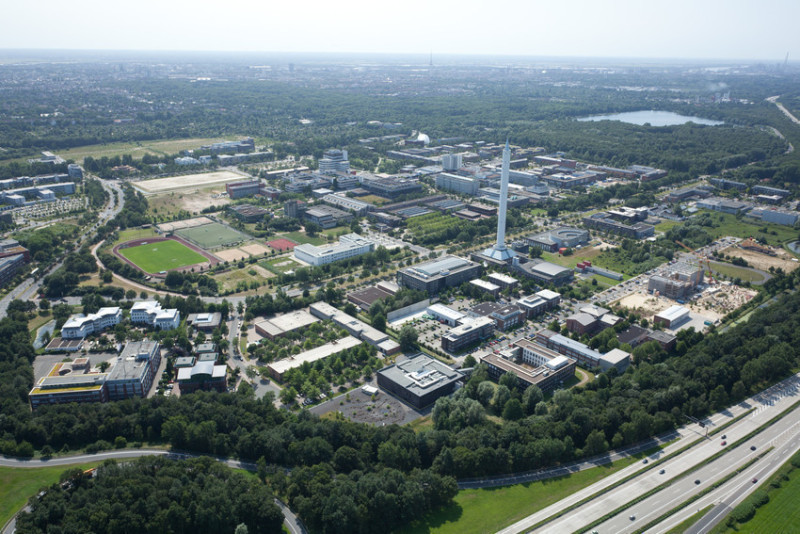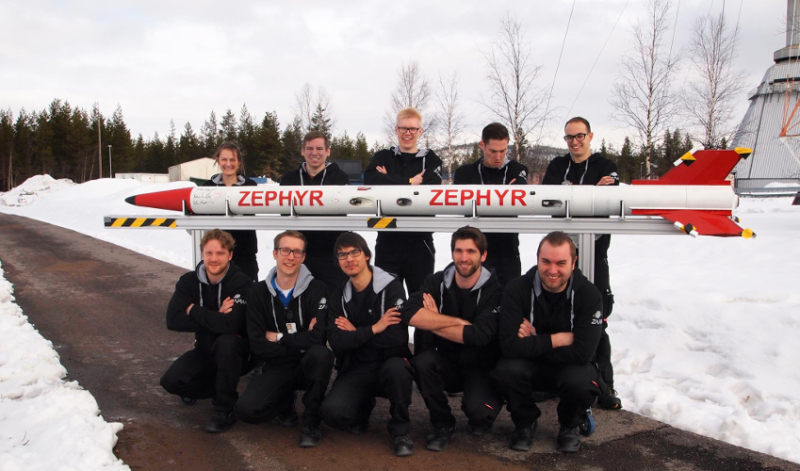Studying and researching in Bremen – a success story
ScienceOf all the states in Germany, Bremen has the highest density of major research institutions in relation to its population – a fact that also benefits those who study there. It offers a range of international education opportunities for prospective academics with strong practical relevance and research activities that span a diverse range of fields.
The close connections that Bremen and Bremerhaven share with their local research institutions make them ideal locations to study in. There are numerous examples illustrating the quality and variety of opportunities on offer to the 35,000 students throughout the state of Bremen. It is a place where scientific theory and research practice come together in a dialogue that benefits everyone involved.

Whether you're a high-flying academic or just starting out, Bremen is the place for research
Research has always been – and remains – an important factor contributing to Bremen's appeal as a place to study. The state's many research centres firmly cement its status as a scientific hub, playing host to renowned institutions such as the Max Planck, Leibniz and Fraunhofer institutes as well as the Marum, ZARM and ISL. The German Aerospace Centre (DLR) and the German Research Centre for Artificial Intelligence (DFKI) also have sites in the city. Naturally, the vast number of students in Bremen and Bremerhaven also benefit from the presence of these institutions.
In 2016, a student project at the University of Bremen's Centre of Applied Space Technology and Microgravity (ZARM) created something of a buzz. Following four years of planning, an eco-rocket powered by candle wax that was built by students from ZARM's production engineering department was launched at the Esrange Space Centre in Sweden. 40 students were involved throughout the course of the project, which took place as part of the DLR's STERN programme. (The name 'STERN' comes from an abbreviation of Studentische Experimental-Raketen – 'Student Experimental Rockets' – and also happens to be the German word for 'star'.) The many years of planning paid off – ZEpHyR, the ZARM Experimental Hybrid Rocket, was successfully launched on 16 April 2016 and flew to a height of 1,500 metres using the new rocket propulsion system. It was a success for everyone involved – certainly for Peter Rickmers, who was the ZEpHyR project leader and a researcher at ZARM at the time, but even more so for the students who also took part in the project. We met with Peter Rickmers and Thomas Ganser, who was involved in the final phase of ZEpHyR during his studies, and spoke to them about the many opportunities that Bremen provides. They were able to tell us more about how to get involved in research activities while studying at one of its prestigious institutions and gain important experience – both personal and professional – for the future.

Bremen is the location of choice for many budding academics
Bremen sets high standards when it comes to teaching and research. Thanks to innovative research projects and modern study programmes with an international focus, it offers researchers and students the ideal conditions to develop their academic careers. In turn, research institutes are able to recruit highly coveted specialists. Results of the Bildungsmonitor national education survey for 2015 showed that Bremen had the fourth-best ratio of students to teaching staff at higher education institutions, in comparison to other federal states. There is one teacher or lecturer to every 16 students here. The proportion of graduates living in Bremen is also excellent: in 2015, its roughly 6,100 graduates amounted to 9 per cent of the total population aged between 15 and 65 with at least one academic qualification. This means that it has the highest ratio of new graduates to people of working age with a degree, in comparison to a national average of 5.2 per cent. Therefore, according to the Bildungsmonitor 2015, it has once again made a substantial contribution towards reducing the current and future skills gap. Additionally, Bremen was ranked first place out of all federal states for proportion of graduates among people aged 25 to 40. The state is a very attractive location for students coming to study from other regions, meaning that study places in Bremen are highly coveted – there are more prospective students coming to Bremen than school leavers from Bremen itself who go to study in different states.
Accordingly, Bremen is second only to Saxony when it comes to taking in the most incoming students from other federal states.
Subjects for high-tech sectors in high demand
Bremen ranks particularly highly for STEM subjects (i.e. science, technology, engineering and mathematics). In the Bildungsmonitor 2015, Bremen took first place in a ranking of states by STEM subjects in higher education. Its score of 82.4 points gave it a comfortable lead over second-placed Saxony, which received a rating of 68.1 points. The Bildungsmonitor provides a state-by-state overview of how the education system contributes to the training of new academic talent, in this instance focusing on the STEM subjects. 19.1 per cent of all university graduates in Bremen in 2015 studied mathematical or science subjects, in comparison to a national average of just 15.1 per cent. Bremen also led the way when it came to research fellows in STEM fields as a proportion of total research staff. In 2013, Bremen's ratio in this regard was 46.1 per cent, while the national average was only 36.4 per cent. Measured by R&D staff in the state, Bremen educated an above average number of STEM graduates in the same year (26.2 per cent compared to the national average of 18.4 per cent) . And when it comes to attracting funds for research, Bremen is also one of the leading states. In 2015 alone, Bremen was able to raise €196,900 in private funding for every professor – a value surpassed only by Saxony.
An overview of Bremen's higher education institutions:
Public universities
- University of Bremen
- Bremen University of Applied Sciences
- University of the Arts Bremen
- Bremerhaven University of Applied Sciences
Private universities
- Jacobs University Bremen
- APOLLON University of Applied Sciences
- University for International Business and Logistics
- FOM University of Applied Sciences for Economics and Management
You can learn more about aerospace sector activities in Bremen here.
Success Stories
Bremen’s Economy in Figures: Statistics 2025
The State of Bremen is a strong economic hub. A look at the latest statistics highlights its economic strength — summarising key data such as cargo volumes, export performance, industry turnover, and more.
Learn moreMedium-Sized Companies in Bremen Showcasing the Full Range of the Local Economy
Medium-sized companies form the backbone of Bremen’s economy. They create jobs and produce goods that are in demand worldwide. Here is a selection of ten businesses that illustrate the diversity of Bremen’s economic landscape.
Learn moreTwelve international food and beverage companies in Bremen
Becks and Melitta may be high-profile brands, but international food and beverage companies also manufacture lots of other products in Bremen and Bremerhaven. Here are twelve examples.
Learn more
